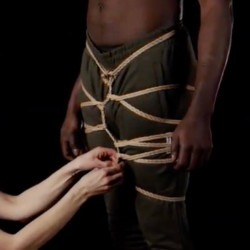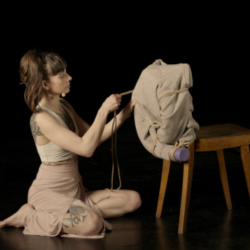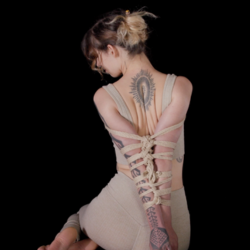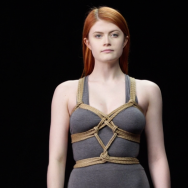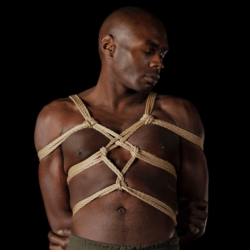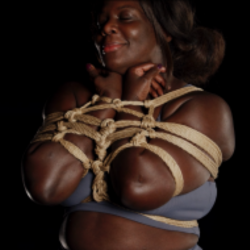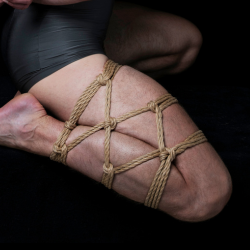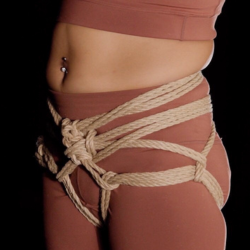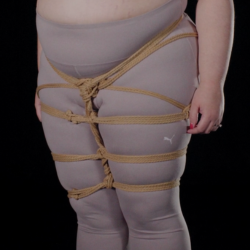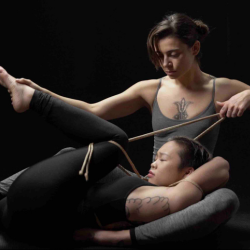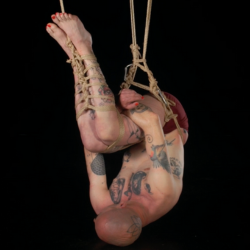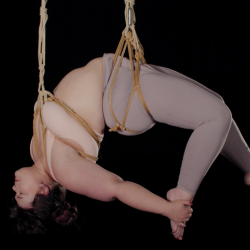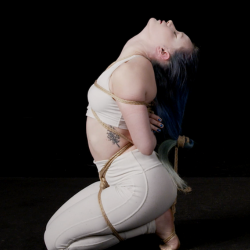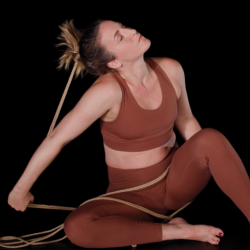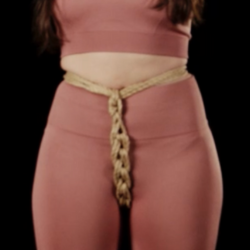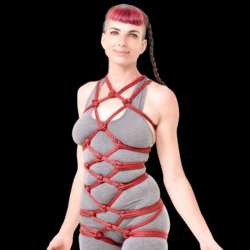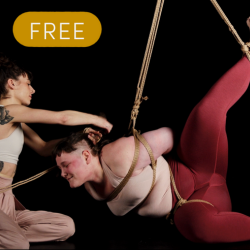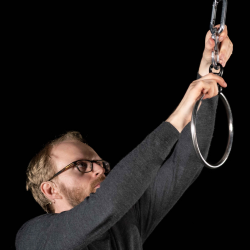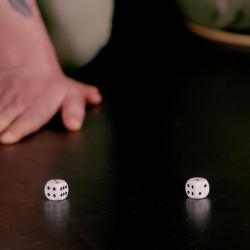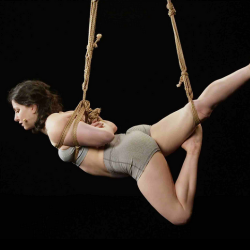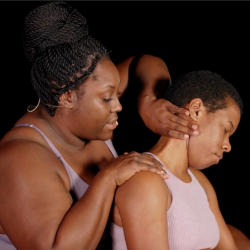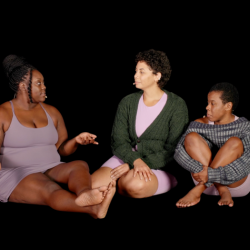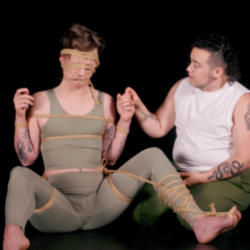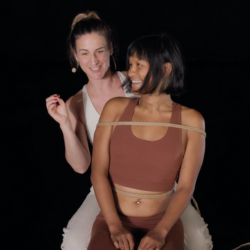EP 22
DANCEHALLDYKE & SLAB_ME_HARDER
In this episode, Kit aka. Dancehalldyke (she/they) and Juliette aka. slab_me_harder (she/her) draw parallels between the risks of backcountry skiing and rope play, emphasizing the crucial roles of negotiation and debriefing in managing these risks and building trust.

Dancehalldyke (she/they) and slab_me_harder (she/her) are a lesbian rope couple from San Francisco who have been tying together for five years and married for four. Through rope they seek to explore each other’s emotions, capabilities, and vulnerabilities.
Wicked Wren [00:00:12] Hello everyone and welcome to the Shibari Study podcast. Today I have on Kit and Juliette. They're both a rope pair. Kit uses she/they pronouns, Juliette uses she/her pronouns. Kit is a rope switch and Juliette is a rope bottom and, quote, is "reluctantly learning how to tie". How are you two?
Juliette [00:00:37] Good. How are you?
Kit [00:00:40] Thank you for having us.
Wicked Wren [00:00:42] So I do have to ask. Juliette, why are you saying that you're reluctantly learning to tie?
Juliette [00:00:49] I mean, so I'm learning to tie because I love rope and I'm interested in like engaging in the hobby on a deeper level. And also, it will give me other things to do at jams and things when I'm not being tied. But also, I'm a little bit reluctant because I don't particularly feel a deep desire to be like the toppy top who's going to like dominate people or like... I'm struggling to find that motivation of like, you know, some people I think are drawn to the role of top. They want to tie people up. And I'm like I don't know if I really want to do that, but like, I like rope and this is half the part of the community. Maybe I should try to explore it, I guess.
Wicked Wren [00:01:28] Yeah. Do you feel like you'd like to do (…) things or like pain things or do you want to make people feel good in rope? Do you have kind of a mission objective?
Juliette [00:01:38] No, I think that's why I'm reluctant. It's like I don't have that mission yet. My mission is to try to do what people want. But I feel I don't know what I want to do. I'm just learning to tie.
Wicked Wren [00:01:49] That makes sense. So, Kit, what is your style of rope topping?
Kit [00:01:54] Oh, goodness. I think I have gone through a lot of different rope styles as a top. I definitely have some (…) moments with with the right person who is Juliette in particular but also others. And I think we've been pretty inspired by kind of the more Barkas-y interview-y style. So I do, I do love that. That's (…). I think – something I really enjoy in topping is leaning into really felt emotions, whatever they might be in the moment.
Wicked Wren [00:02:45] I love that. It sounds like you're very intuitive.
Kit [00:02:49] One hopes.
Wicked Wren [00:02:53] So you two have been together for about six years, and you learned rope together?
Juliette [00:02:58] Yes, we started learning rope together, I would say when some people we were dating together kind of started teaching us.
Kit [00:03:11] We started when we were both in grad school in Wisconsin, and we went to Hitchin' (…) Wisconsin in a very sort of more unemotional clinical learning environment, but one that felt still very, very safe I mean.
Juliette [00:03:33] I mean rope in Madison, Wisconsin is the rope capital of the world as the old-school people know.
Kit [00:03:40] As they say.
Wicked Wren [00:03:41] I hear that shibari originated in Wisconsin.
Kit [00:03:45] Wow. Really? I didn't know that.
Wicked Wren [00:03:47] Yeah, well, look, stick around. You'll learn a thing or two.
Juliette [00:03:50] There was actually a surprisingly good community there, I would say, for how – I mean, it's a town of 200,000 people and there were like multiple rope events each month, multiple rope places. So like, it was surprisingly good, all things considered.
Wicked Wren [00:04:04] Yeah. And, Kit, you said that it was really clinical.
Kit [00:04:09] It's totally different from the kind of rope that I'm interested in now. It was still useful, but a lot of that was much more focused on decorative patterns and kind of just the pure act of tying rope and not so much focused on emotions and the like interpersonal relationships.
Wicked Wren [00:04:37] That make sense. How long were you two dating before you started doing rope, or was that kind of at the same time?
Kit [00:04:45] Maybe a year or a year and a half.
Juliette [00:04:48] Yeah, it was about a year, a year and a half, in that we started exploring rope together.
Wicked Wren [00:04:54] And how did that work together? So it's like pretty early in the relationship and you're adding this thing where you're learning something together. Were there any big struggles in the beginning or...?
Kit [00:05:09] Definitely. I think every couple who starts learning rope together goes through a massive struggle to do so. I think there's a big asymmetry in the learning process from top and bottom perspectives. And I think our story is not really an unusual one. Juliette, I think was interested in it first mainly, and then I was kind of topping along for the ride. But the learning curve, topping is, at least for me, it did not come naturally. It was not, it was not intuitive. And then I am also a teacher in my real life, and from an educator perspective, like not all of the education was as clear as I, as I would have liked. And so I think there was plenty of different things.
Juliette [00:06:15] I think from my side, right, I think there were probably plenty of times where like – we were, we'd be doing rope and I'd be like, I want this good rope feeling that I have had before or that like I'm imagining people are experiencing from the photos or seeing on Instagram or things. And, you know, it's not happening. And that can be frustrating. And while I like to hope that I was as graceful and compassionate and thoughtful as I could be at all those moments, I'm also sure that as a human being, I like at times let some of that frustration escape me in ways that was not particularly productive.
Wicked Wren [00:06:49] Absolutely.
Kit [00:06:50] And you also had other rope partners that you tied with who were much more experienced than me when we started. And of course, now that Juliette is reluctantly learning to tie. Her own words. Now, of course, I'm in that position of trying to bring my best, most gracious self and like totally failing.
Wicked Wren [00:07:15] I love that. Well, it's a little bit of a payback, you know?
Kit [00:07:17] Oh, it definitely is.
Wicked Wren [00:07:20] Do you feel like when you tie Kit, you're, I don't know, maybe like a little more empathetic to her? Like I know exactly what you're going through while I'm trying to figure this stuff out.
Juliette [00:07:34] Yeah, I mean, I think, I think I always knew it was hard but I think like, there is somehow this – for me, I think, there's like this barrier that I think I never realized quite how difficult it is to get through. How like, you can know how to tie the pattern, maybe you could tie something, you know, in practice. But then like, the minute someone says and scene like...
Wicked Wren [00:07:58] All that's out the window.
Juliette [00:07:59] That idea of like, you're going, for me at least, that you're going to invade someone's personal space and maybe like make them uncomfortable and maybe like, having to navigate very complicated emotions and make decisions. It's like it's no longer like, how does this feel? Let me ask you every, check in every step of the way. It's just so totally different in form that I think – while I could maybe intellectually appreciate this fact when I just, you know, we were first learning together like, I think experiencing it is very different.
Wicked Wren [00:08:29] Yeah. You said something really interesting that when you start to get tired, you see pictures and you kind of inject what you think the person's going through and then you essentially try to make yourself go through those things. And then also you realize that those things probably weren't even happening, that you were prescribing to the pictures. That was something I really had to get over, at least.
Juliette [00:08:54] Yeah. I mean, I think now that we've done – I mean, we would do it with ropes a lot longer. We do a lot more things. We occasionally do ropes for photos. I totally recognize that photos aren't reality somehow. Like even rope photos which come across as very authentic somehow because like, there's so much emotion, so it's supposed to be such a personal moment. But, you know, like, it's not always what you see in photos. It's not always reality. And also, I think there was something – we were doing a tie recently and like... You were like, You're chewing too much. Like you're trying to scene out at your skill level, which is like not where you should like, you know. Don't do that. Just like, wrap. Just do wraps and do them like hard and with meaning and feeling and in time to like emotions. Like, don't worry like fiddling with things. I think, you know, that's what we were trying early to some extent early on. I think that's often a pitfall that I've certainly fallen into.
Kit [00:09:55] If I were currently taking another couple on the rope journey that we started out on, however many years ago, I would start them off in a pretty different place of more in that sort of, Here, try to do some simple kind of scenes just with... But try to build in that emotion so you both have something to be interested in and something that you can go for in more difficult patterns and ties.
Wicked Wren [00:10:33] Yeah. How long did it take you to get over that initial hump of getting into tying? Because you said the learning curve is super steep.
Kit [00:10:42] Oh, about seven or eight years.
Wicked Wren [00:10:44] Okay. Wow. Long time.
Kit [00:10:48] No, I'm making a joke. I'm sorry.
Wicked Wren [00:10:50] It was really good. So is that a negative, too?
Kit [00:10:53] It's not.
Wicked Wren [00:10:55] So maybe you're still working at it.
Kit [00:10:58] Something that really helped me was actually when I started to tie with some other people and then tying some other people and tying a lot more gave me a different perspective so that when I now return to tie with Juliette, I have this sort of knowledge of like what other shapes and worlds are possible. And that's really helped me. And so I would say... Oh, gosh, it feels like really, though... Maybe like, four years that I was tying before I really felt like I understood. So maybe I've been tying, like, well, for maybe a year? Yeah. No, no, no, no, maybe not.
Wicked Wren [00:11:49] I think in, like, ten years, I have probably said the same thing. I've been tying well, for about a year.
Kit [00:11:54] I'm certain I will say exactly the same thing. Yes.
Juliette [00:11:58] I mean, I will say on my end though, like I do look back on many of those early ties, I can remember like plenty of times being frustrated or like us having like conflict is too strong, but, you know, us ending scenes, not like how we would like them to but they're also like a lot of really great memories and times that I at least remember from some of those early ties. And I think –
Kit [00:12:21] Which I'm really gratified to hear. That's very generous of you.
Wicked Wren [00:12:28] Earlier, you brought up the camera, and I'm curious what the camera plays in the scene. Like, what is social media mean? Those kinds of things.
Juliette [00:12:38] Oh, I hate social media. Like I, I guess, okay, I have a – I feel like the cliché answer that everyone gives probably is that I have a love-hate relationship with social media and that, like I enjoy at times its ability to connect me with friends and people that I'm slightly more distant from. But I think my experience with rope is that I'll often go through kind of negative, have a lot of negative feelings about social media and that especially things like Instagram, I feel like are often – feel very much like a clout game. Like, you know, posting. You have to – if you didn't post things from your ties recently, did it really happen? Like, like if you're not chasing the follower counts, like, you know, are you like a real person in this rope scene who is about you. And I think obviously, I think most people and myself certainly would say that like your Instagram presence doesn't define you as a rope person and doesn't define your value in the rope community. But I do think like, it opens doors or closed doors to some extent. Like when it comes to deciding who is going to teach you or if you want to go with like teacher cons or you want to go travel places. People are going to look and say like, Oh wow, you have X number of followers. You must know something. Or like, you know, or, or vice versa. And I also think this also ties to like identity of like what is Instagram's algorithm going to push to the top? Are they going to push like people of color, larger bodies, trans people, queer people to the top of their algorithm? Or is it going to be like, you know, kind of more of the cultural hegemony?
Kit [00:14:19] For me, Juliette has had Instagram a lot longer than I have. I've only had an Instagram since October (2022). So maybe – how long is that? Eight months or ten months or so. And so a lot of my time tying was just Instagramless. So it was sort of, it was sort of beautiful to not have that pressure. But I do – it's a lot of the community is there, and so it's a big part of connecting with the community, especially people like locals.
Wicked Wren [00:15:06] What was the push to get Instagram?
Kit [00:15:10] Well, that connection definitely. So I think kind of after Folsom, after some other trips we did over the summer last year, and I was kind of missing people from other areas that I've met. And, but hearing about their exploits from Juliette and other partners on like through Instagram. And so I kind of felt like I was missing part of the community.
Wicked Wren [00:15:43] How do you feel now that you post Instagram? You can never go back.
Kit [00:15:48] I feel more comfortable there than I was expecting to. And I hadn't had social media really for... Okay, I had Facebook and I deleted it when I was 16. And I never went back. And now I'm almost 30 for context. And so I was – it gave me a lot of anxiety or it used to. And so I was worried that Instagram would give me that same anxiety back. And I think it does for many, many people. But luckily, I've been able to keep a lid on that.
Wicked Wren [00:16:25] Wow. I'm a little bit envious. I mean, it's very cool. Because I can't remember a time where I haven't had social media. Just been in the machine, scrolling in the machine. It's awful.
Kit [00:16:40] Can I recommend taking a 14-year break?
Wicked Wren [00:16:44] I'm going to get on that.
Kit [00:16:45] Okay. All right.
Wicked Wren [00:16:49] So throughout this whole time, you've both been talking about struggles and things like that. And I really want to tell everyone listening that you two are highly, highly educated. And I think that that's just something to point out is still having struggles with patterns and learning curves associated ropes really, really hard. It takes a lot of time. I feel like people don't realize the time resource that you have to have to learn rope to be able to do it proficiently and things like that.
Kit [00:17:23] My gosh. Yes.
Juliette [00:17:25] I think it takes a – I think it takes so, so long. I mean, I think as you were saying, we both have a lot of advanced education and our jobs are in some sense helping other people learn kind of. You know, STEM-based fields and it's fascinating to think when like, we think about how long we give people to learn other things in the world. How like in comparison, how quickly we expect to pick up rope. And it just would never happen that way.
Wicked Wren [00:18:03] I was about to say, what a fascinating thought. I've never thought about it like that. People go to college for four years to learn something and become proficient at it or even start a job to become proficient at it.
Juliette [00:18:14] Yeah. I mean like, it's, it's like if you think about rope as maybe a language, which is a metaphor I'm sure many have used before, right? Like, just how long do you expect to take to become fluent in a language where like... And if you expect to do like a pick-up play with rope, how long do you expect to be able to like, just be able to walk up to a random person in a foreign language and have a conversation which is almost what you're trying to accomplish I would be saying.
Kit [00:18:38] And well, like not everyone, but some of us are trying to accomplish is to have a conversation about like that person's childhood and their family trauma and their emotional state. It's a complicated conversation.
Juliette [00:18:54] You're trying to have a complicated conversation with a lot of emotions.
Wicked Wren [00:18:58] Yeah. And there's regional dialects and regional slang, and there's all these different things like that we're not even thinking about. It's wild.
Kit [00:19:08] Yeah. I think also – so as the maths teacher that I currently am, I, you know, I ask my students to do homework every day. They have to do their homework every day. And I think that's often not an expectation that a lot of us have when we do rope, is that we're going to practice every day. And so I think my rope got a lot better when I was starting to tie like three or four times a week, which is really, feels like a lot.
Wicked Wren [00:19:48] It is. It is a lot. Huge time commitment.
Kit [00:19:53] But as someone who has had to learn a lot of things and kind of think about how to learn things that super often... Practice has been really, it seems really key. Yeah.
Wicked Wren [00:20:10] Yeah, I would agree. Outside of rope, you two do a bunch of outdoorsy things. And you're telling me about risk profiles and how it's related to things like skiing or doing outdoor stuff. Can you talk to me a little bit about that?
Juliette [00:20:28] Yeah, I mean, I guess so on one, the one hand I think it has kind of – so things like climbing or backcountry skiing, have really like simultaneously opened my risk profile a lot in the sense that like... It feels a little like hypocritical for me to be super worried about some things in rope when I'm like, Well, yesterday I was 20 feet off the ground without a rope and like, you know, that was just an acceptable part of the climbing risk. But now I'm very worried about something else. And of course, these risks are different, but like, I think in that way it kind of puts certain risks in rope into perspective, in a particular perspective for me that I think might mean some of think you my risk profile is a little bit too liberal. And on the other hand, I think it also has given me very dedicated perspectives on how to kind of approach risk systematically. Like you should think through risk and how you approach risk as it kind of both individually and together in a way that allows you to think through things carefully.
Kit [00:21:37] I think something I've learned from backcountry skiing is we go through this whole process to manage avalanche risk and backcountry skiing of plan, carry out the plan and debrief. And I think a lot of us do this in rope as well as negotiate, tie, debrief. And I think that process is both really valuable for thinking about what risks are we planning to take on during this tie? And then in our debrief, what risks did we take on during this tie? And just in general, learning about each other and rope, having that debrief time like how did this go? Did we carry out our plan? What what would we want to repeat or what we would prefer to skip next time?
Juliette [00:22:33] And I think in a similar vein, a big part of like, the thing when you're trying not to die in an avalanche, they tell you, is to like, build your plan based on the level of uncertainty you have, right? So like, if you're really uncertain whether there was going to be an avalanche, maybe don't stand under where there might be one. And I think that approach, that thought has often influenced how I do rope. So, for example, with Kit who I'm, you know, married to and play with frequently like I'm very happy to go very risky places because I trust that we have the ability to repair things if things go wrong or if something really bad happens physically, emotionally, like socially. We'll have a foundation to fix those, whereas if I'm tying with someone for the first time, I might not be like, Hey, let's really try to play with this trauma or like, Hey, let's try to really suspend me off something high in a dangerous way that if I fall, I'm going to break a bone and you're going to have to, like, figure out how to get me to the hospital.
Wicked Wren [00:23:32] That makes a lot of sense. I've never thought about it like that. Negotiating based on how much uncertainty there is, I suppose. Really cool way of doing it. My experience has been the majority of risk isn't physical, it's mainly emotional, and it's usually from being very prescriptive, saying, This is what I want to feel in a scene, This is what I want to do with you versus having a fun time and treating it as a fun activity that two humans can do together.
Kit [00:24:11] Yeah, I, I definitely understand that. I think – I'm not certain whether I know if emotional risk is more likely than physical risk for me personally with the people that I tie. But I definitely think emotional risk is more of a serious... It feels more threatening. It feels more like it has the potential for really severe permanent damage. And so I think something I often offer is Here are some multiple choice emotions that we can work with in our tie today. Here is – and I always like to talk with people about where we are at that very day. Like, how has your week been? What are you feeling in this moment? What's going on for you in other parts of your life to the extent that you're comfortable sharing that? And then kind of create the emotional landscape of our time based on that.
Wicked Wren [00:25:20] You said multiple-choice emotions. Very intriguing. Can you walk me through a little example of what that would be?
Kit [00:25:28] Yeah. So I think especially with a newer person, I often kind of offer, Here are some directions that I feel more confident tying you in today. Like, we could try to do something that was a little bit more like sweet and close and quiet, internal, and that dictates, you know, what I do after that. Or maybe this is someone that I have a more intimate relationship with already. And then I say, Oh, I'm going to do something more (…) or maybe we're just going for something more fun and acrobatic or something violent and aggressive. All of those are sort of like – that's what I mean when I say multiple choice.
Wicked Wren [00:26:20] Very cool. Very cool.
Juliette [00:26:24] Yeah, I think I have come to really think that there's a lot – the emotional risk in rope is really vast and that it's something that should probably be talked about a lot more and that it extends... It did in so many different ways. So I think like there were the obvious emotional risks of like, Oh, if you're doing a scene where you play with trauma, you might do something that hurts someone or like brings up some bad feelings. And I think maybe we also have some sense that like, if we're doing things in rope that might even unintentionally bring up negative feelings like, Oh, you tied me in a certain way. And that triggered how I'm feeling about my body or, Oh, you touched me in a place and I got weird feelings about it and I didn't expect those to come up. It brought up past kind of negative experiences. But I think like whenever you're bottoming, you're often in this really weird headspace where you're really vulnerable to kind of taking what the person you're tying with really, really seriously invaluable. And so like, if they make you feel valued or they give you this value, they give you, You're beautiful or ugly. Those like judg– not judgments, but those perceptions might stick with you a lot longer than you think. It's not like you're going to walk away from that scene necessarily and have those emotions immediately disappear. And I think beyond that, like the rope community as a whole, is dealing with a lot of emotions from the start to the end, whether it's like, it's really emotionally vulnerable to put yourself out there, to ask someone to tie. And if you're a bottom, you might have to put yourself out there a lot to be rejected a lot and that might affect how you're feeling when it comes to desirability or self-image. And if you're a top, you have the opposite potential problem. You're saying no to people or maybe you aren't saying no, you're feeling super popular or in like even in other ways, right? Like, I kind of, I've experienced it where like there is a miscommunication over like to what extent someone I was tying with wanted to continue tying and, you know, or what frequency they wanted to tie with, and it kind of... You know, this like poor communication on my side led to me feeling like really kind of bad because like, wow, this person I thought wanted to do something isn't doing it anymore. So I think there's like all of these emotional pitfalls from like literally the moment you walk in the door to you like asking people to tie or not tie to like forming tying relationships to in the tie. That was like an emotional minefield.
Wicked Wren [00:28:57] Yeah, it's hard because it's very, very connected. It's very intimate. And then we leave and go on and do our lives. And we don't really have the tools to close a lot of those gaps that are opened or holes that are opened. It's a very weird thing to navigate, like you said.
Kit [00:29:13] Which is part of why I love my debrief time so much. I feel like it really helps because that.
Wicked Wren [00:29:23] Can you walk me through a debrief time? Like, could you give a structure for somebody that wanted to put that into their own time?
Kit [00:29:31] Yeah. I ask pretty standardized questions during a debrief, and my questions are usually, What feedback do you have for me? What do you want more of or less of if we're going to tie again? And do you have any favorite moments or time? And so it highly depends on what kind of responses I get between person to person and tie to tie. But also the way someone answers those questions tells me and gives me a lot.
Wicked Wren [00:30:11] How do you two debrief? In the same way?
Kit [00:30:18] Sometimes. And sometimes our debriefs were minimal. We did this rehearsal just yesterday where at the end of our tie we were both crying and pretty emotional. And I don't think we talked about it at all. I think we just went straight to work.
Wicked Wren [00:30:45] It makes sense.
Kit [00:30:48] We also have a lot more contexts and spend a lot more time with each other. So I kind of, kind of know why Juliette was crying and why I was crying.
Wicked Wren [00:30:58] You're doing life together.
Kit [00:30:59] Yeah, we're doing life together.
Juliette [00:31:00] Yes. And like one of our friends, I think, somewhat jokingly said, we have an open tie relationship. We're like, you know, and this happened because we were at a party and we were just hanging out and I was talking to a friend and Kit was talking to a different friend. And all of a sudden, Kit walked over and started tying some chest harness on me and I just continued the conversation and Kit was like skill sharing with this friend and eventually like, "Oh, so what are we, what are we doing today?" Like, you know, it was like... But I think we're able to do that because we live together and we've done a lot. And like we feel generally pretty comfortable bringing up when we do need those extra moments of actual care. And like we've had this journey of finding a lot of pitfalls and falling into them and crawling our way out of uncertainty.
Kit [00:31:49] Just to be clear, I wouldn't recommend that people do that, and I certainly would not start to seem that way. That is not – that was like going to be a labbing tie and I started saying like a hip harness.
Wicked Wren [00:32:01] Yes. And I think that I think everyone understands what you're saying. And the reason why you're pushing on this is because you two are married. You have lives outside of (…). And I think that's very common. And I don't think anybody really talks about the realities of those things because everyone's doing stuff like you just said. And that's honestly a beautiful thing where you can just walk up and start tying a chest harness as a skill share to someone else and that's very, very, very, very cool. And I feel not a lot of people talk about that stuff because it's kind of scary to bring up because it might be taken out of context and this and that.
Kit [00:32:41] Yeah, no, totally. And I do also want to plug for like having debrief time even with a close partner because I think by having some debrief time like what those questions that I just mentioned, I have learned a ton from Juliette also. What would you want more or less of? You know that kind of question tells me what I should and shouldn't be doing for next time.
Wicked Wren [00:33:09] That makes total sense. I have a strange question that I had a long time ago. Don't even ask. What is the difference between backcountry skiing and like normal skiing that I know?
Juliette [00:33:21] Oh, so that's a great question.
Wicked Wren [00:33:24] Thank you so much.
Juliette [00:33:25] So I think when most people think of normal, like downhill skiing, you imagine going to a resort and you put your skis on and you maybe shuffle over to a chairlift and you sit down on this chairlift or step into a gondola, it takes you to the top of the mountain. And then you ski down this like groomed slope that like ski patrollers have been maintaining to make sure it's safe.
Wicked Wren [00:33:48] Yeah. Big bet.
Juliette [00:33:48] And so backcountry skiing is the idea where, like, you put your skis in your car and you drive into the woods to the bottom of the mountain and then you like use your skis to get you to the top. And there's no avalanche mitigation. So like, it's just, you know, a mountain out in the woods somewhere and you ski down and you're – it's up to you to determine like, how do I get to the top? What are the risks? Am I about to ski off a cliff? Am I going to ski into, like a crevasse? Am I going to ski into an avalanche? Someone's backyard?
Wicked Wren [00:34:23] Why would you want to do that when there's a lodge with, like, hot cocoa in it at Mammoth's and Big Bear? You know, these exist people, you can just go there. It's very comfortable. There's a sandwich shop.
Kit [00:34:38] You know, I totally agree. And sometimes I don't want to do rope either. I just want to sit on the couch.
Wicked Wren [00:34:46] The equivalent of the lodge.
Kit [00:34:49] I mean, so we see a lot more places by country skiing. There fewer people. An you know... people. It's kind of like hiking. Like if you ever went hiking. And you kind of just enjoy, like, going on a walk and being out in the wilderness. It's kind of like that. But there's snow and then you can go downhill really fast.
Juliette [00:35:10] I mean, I think it's a really different-- it's very different, but it's also... Like it's the same sort of painful enjoy a different sort of painful enjoyment fun, right? Like I – as much as I love getting to the top view chairlift like there's something really nice about like spending 3 hours painfully slowly skinning your way to the top of the hill.
Kit [00:35:32] Juliette's a (…).
Juliette [00:35:33] Getting there, like getting out for this beautiful vista and seeing it and then like, the ski down is pretty great but like, it's the ski up that I think I most enjoy.
Wicked Wren [00:35:42] I agree fully. That's what I want in rope as well as I want to feel like I survived it. I think I don't like hiking, but I do enjoy the beer after I hiked. That's the only part of it I like. Skiing I'm a little rough at. I just hamburger hot dog or is it... No pizza, pizza hot dog down the hill? It's... I'm really bad at it. So Kit, I hear you're also a dancer.
Kit [00:36:09] I grew up doing ballet. I kind of squeaked by without having to do it professionally and went to college mercifully. And I think it's definitely informed my aesthetic choices in rope and both makes bottoming easier and harder.
Wicked Wren [00:36:37] Tell me about that.
Kit [00:36:41] I still have a lot of that flexibility. And that includes sort of shoulder flexibility which is kind of a blessing and a curse. I've dislocated both of my shoulders maybe five times each.
Juliette [00:36:58] Not in ropes.
Kit [00:36:59] Not in rope. True. Luckily. That would be horrible. But I only came to rope after I already had dislocated them many, many times. And also, I think, you know, ballet isn't really that great on your body generally speaking. Or on the mind or soul either. And so I also have some, some plenty of like stiffness and knee issues and hip issues and back issues and just all sort of all mixed things.
Wicked Wren [00:37:34] All I really know about ballet is from movies and media and things. And it looks brutal from what I can infer.
Kit [00:37:42] At some point, I heard that professional ballet is second hardest on your body only to professional football.
Wicked Wren [00:37:50] Wow.
Kit [00:37:52] And I definitely believe that when I, at the time when I quit, I was doing ballet 18 hours a week or so and I was pretty much half dead. And I think something that is talked about but not quite as much as it's not quite as obvious, maybe as the physical difficulty is also the emotional strain. It's not a good environment to be a queer woman. Gender is very... Gender on the femme side is very strictly enforced. And the... Just the body image issues and the pressure is unimaginable.
Wicked Wren [00:38:40] Do people's toenails really fall off?
Kit [00:38:43] Yes. Yes. Yes, very much.
Wicked Wren [00:38:47] That is insane.
Kit [00:38:48] I still have toenails, but they're super messed up.
Wicked Wren [00:38:55] How did you navigate being a queer woman in that space? Can you talk about that a little bit?
Kit [00:39:02] I... I didn't. I didn't. I was... I was closeted.
Wicked Wren [00:39:11] That makes sense.
Kit [00:39:12] In ballet, yeah. And only, like, four years after I quit did I really sort of come into a different understanding of my gender and my identity.
Wicked Wren [00:39:30] Yeah, I hear that. And it just sounds like one of the hardest things that you could have to do, have to like navigate and stuff like that.
Kit [00:39:40] If I had a daughter, I would not recommend ballet.
Wicked Wren [00:39:47] I spoke to Fuoco and saying her name is so hard for me in general.
Kit [00:39:52] Congratulations, you did it.
Wicked Wren [00:39:54] Thank you. She was talking about – she's an aerialist, super in tune with her body. And I asked about her core and she's like, "I still am figuring out about my core and how to use it" because I have the same assumption – everybody does, where if you're an athlete, if you're a ballerina or a dancer or an aerialist, you must be a really, quote unquote good rope bottom because you have all this core strength and things like that.
Kit [00:40:22] Yeah, I think I have a lot, as do a lot of other dancers and aerial people and other kinds of athletes. I have a lot of body awareness that often translates to rope, but certainly not always. So there are definitely times when I'm like in the backbend thinking, Okay, it's core time. And there are also times when my kind of own flexibility is, is a problem in in rope bottoming and that's really a thing.
Juliette [00:41:02] But I mean also and you can say if you disagree with this, I think a lot of kind of... Our notion of beauty or aestheticness inside of rope is shaped a lot by kind of our cultural aesthetic of beauty and grace, which, you know, is, is in fact, you know, viewed, you know, viewed often through dance. I think like a lot of the poses you might see in rope draw very similar things when we consider the aesthetically beautiful to kind of some of the poses you would see in say, in dance as opposed to maybe... I think if you saw someone in rope posed like a football player, that might not be considered as aesthetically.
Kit [00:41:46] I would love to see that.
Juliette [00:41:47] I mean, I agree. But I think like I guess I think there's also this weird gender thing, right? Where like the things, you know, that were often the most prominent image, I would say, of like beauty in rope is kind of a very feminine image that often draws from the classical canon.
Kit [00:42:04] It feeds into a lot of those things that ballet also does. You know, skinny, feminine and flexible.
Wicked Wren [00:42:14] Yeah. It's – we really prioritize white cis women in rope. The smaller you are, the more bendy you are, all those things. And that's difficult getting into rope because it's like I didn't see many of my bodies being tied. So I was like, I don't know if I can do this. Also, all the education is kind of made for that body type.
Juliette [00:42:37] I mean, as, as a queer trans person, like, I certainly – as a trans woman have seen very few, I mean, relatively few people kind of doing rope bottoming at kind of the same – at a like a frequent level. Like I certainly know there are amazing rope bottoms who are trans in rope, but like the representation is much less there. And I think the more in positions of power you look for it, whether it's like in education or performances, there fewer that are there and kind of how those bodies are valued or desired and rope is so vastly different than, you know, other things. I mean, this applies to other bodies too, you know, people of color, larger bodies, etc...
Wicked Wren [00:43:21] How do you feel about pointing your toes in rope? Because I... It looks beautiful. I understand that. And – but it also makes me angry because there's no time where I'm ever going to point my toes when I'm doing something and it hurts. I'm going to do the opposite, probably. So if someone takes out a camera, wants to take a picture now, like point your toes so you look cute. I almost don't want to do it because I'm like, "This is not real and authentic".
Kit [00:43:51] I... So when I'm topping, I would hate to have someone point their toes if that wasn't what felt authentic for them. And I would be horrified if I was holding a camera and told someone to point their toes or if, if I was being told to point my toes. This – you're not my, you're not my ballet teacher.
Wicked Wren [00:44:16] Well, also, as a bottom, I feel like I know that that looks cute because I've seen it. So I want to look cute. So I do those things automatically and I'm like, Why am I doing this, this is so dumb.
Kit [00:44:31] So I actually, I think very, very often do point my toes automatically because of this huge amount of training and upbringing, I actually was – our friend from Seattle was teaching us in rough body play techniques from jiu jitsu, I think. And one of them was you have to step backwards onto the ball of your foot. And I couldn't. I just, my foot went, my foot pointed and I tried it five or six times and I couldn't do it. It was unnerving.
Juliette [00:45:13] I think, like, it's really interesting because like, so we also do a lot of performances. And when I'm performing, I absolutely am thinking, Oh, I need to like try to do this. Like in this rehearsal we did yesterday, we got into this position. I was kind of hanging by a futo and I was like, This (…) sucks. And I like – Sorry, I don't know if I can swear here.
Wicked Wren [00:45:35] You can say all the curse words. Shibari Study loves curse words.
Juliette [00:45:39] Okay, good. Sorry. And so, like, you know, with the free leg, I started kind of thinking like, I need to move this to like make this, you know, just comfortable. And then I was like, Wait, no we're performing or practicing? So like let me, like, arch it backwards and try to point and make this, like, nice clean line with my leg. But like....
Kit [00:45:59] How will you be cute for the 'gram otherwise?
Juliette [00:46:01] But like, I really also love the scenes where it's, you know, maybe just us or something and it's like, I am so completely messed up that like that looking cute is, you know, I'm ugly crying. I am like...
Kit [00:46:13] And that's often my goal for a scene. Like, I started out with, like, working with real emotions, not with... I think having the bottom thinking about what they look like is totally anathema to me as a top.
Wicked Wren [00:46:31] And I think about that too, where when, when I'm performing, I'm like, what am I looking like? But I will also say recently I've been performing with someone and I've gone to places where I forget all those things because I'm in so much pain. And I'm sure you have too.
Juliette [00:46:45] Absolutely. We recently did... Can I say the story?
Kit [00:46:49] I don't know what the story is, so go for it.
Juliette [00:46:52] I recently did kind of a performance. And like we had like planned out this routine. We had the music set and like, we're having a rough day. And we stepped out there and immediately the energy went from like, Oh, this is a performance that was rehearsed" to like, Oh, this is a (…) scene. We're like...
Kit [00:47:13] We went from like, Oh, this is a fun tie. So speaking of this negotiation and debriefing, we went, Oh, this is a fun tie to talking about like actual relationship stuff during –
Juliette [00:47:27] In front of 100 people like, you know, me sobbing mid-air, ugly crying fully as we like... We are dealing with some – we're dealing with some bad feelings I'd rather –
Kit [00:47:37] I'd rather be there and then, you know, Oh point your toes.
Wicked Wren [00:47:41] Yeah, exactly. I mean, I'm just gonna throw this out there, okay? Shoot me down if I'm wrong, but maybe Kit, you need to do a scene as a bottom. And someone needs to be like, Point your toes. And I feel like that could pull on some fun strings, maybe. I don't know.
Kit [00:47:59] I think the main situation – so I have very sensitive shins, and so then for like futos, I often will not be pointing my toes. So that would be like a definitely (…). Point those toes, and it's like... Futo, I'll be like cussing out my top at that point.
Juliette [00:48:20] Or maybe use a good toe rope.
Kit [00:48:23] I always love a good toe rope.
Wicked Wren [00:48:25] We love it here.
Kit [00:48:26] I have been called toe rope-sized queen.
Wicked Wren [00:48:28] Oh, my God. What does that even mean?
Kit [00:48:34] Ballet will mess you up.
Wicked Wren [00:48:35] Oh! A large toe, I understand! I thought you meant like a large rope around the toe or something. I'm up to speed now. Well everyone, on that note on the large toe rope note, I think we're gonna wrap this up. Thank you both for being on the podcast. Wonderfully insightful stuff. Where can people find you? Do you have anything coming up that you want to tell people about?
Juliette [00:48:55] Yeah. So you can find me on Instagram under the handle @slab_me_harder. That's slab like the rock. Not the other words, I guess. You can also find me on FL and Twitter under the same name.
Kit [00:49:13] Yeah, I'm on Instagram as discussed, and FL as @dancehalldike and what are some things coming up? We have a rope share skill share this Thursday. That's maybe a little too soon for your podcast listeners.
Wicked Wren [00:49:34] It's pretty soon. But you know what.
Juliette [00:49:35] But it happens each month so you know...
Wicked Wren [00:49:39] It was really great when it happened. Everyone loved it and everyone learned a lot of skills.
Kit [00:49:44] Thanks. And we have some shows coming up where –
Juliette [00:49:52] Yeah, the biggest being Folsom, Twisted Windows Folsom, this time we'll be performing constantly for 72 hours straight, it seems like.
Wicked Wren [00:50:00] Yeah, that's how it goes. Well, I'll see you both at Folsom and thank you so much for talking to me.
Juliette [00:50:09] Thank you so much for calling us.
Wicked Wren [00:50:10] You're welcome.
Start your free 7-day trial
Get one free week of unlimited access at Shibari Study,
then pay from $17.90/month. Cancel anytime.


